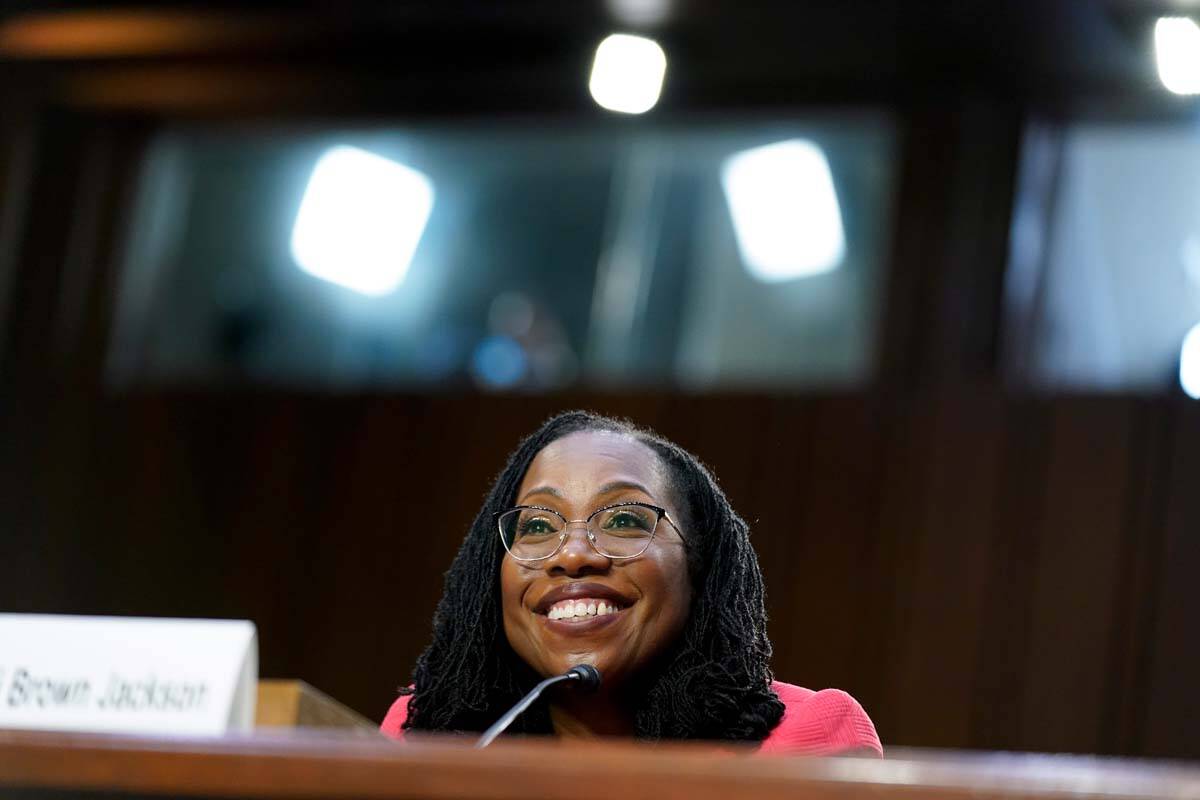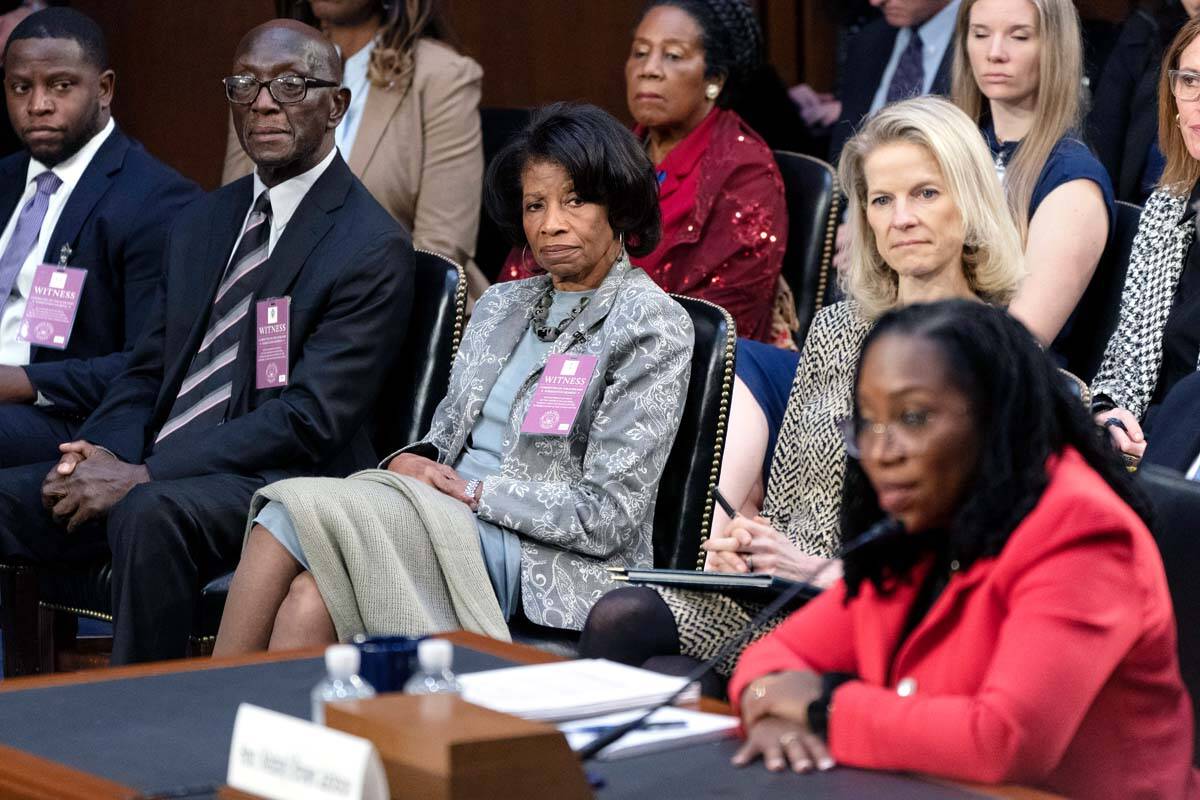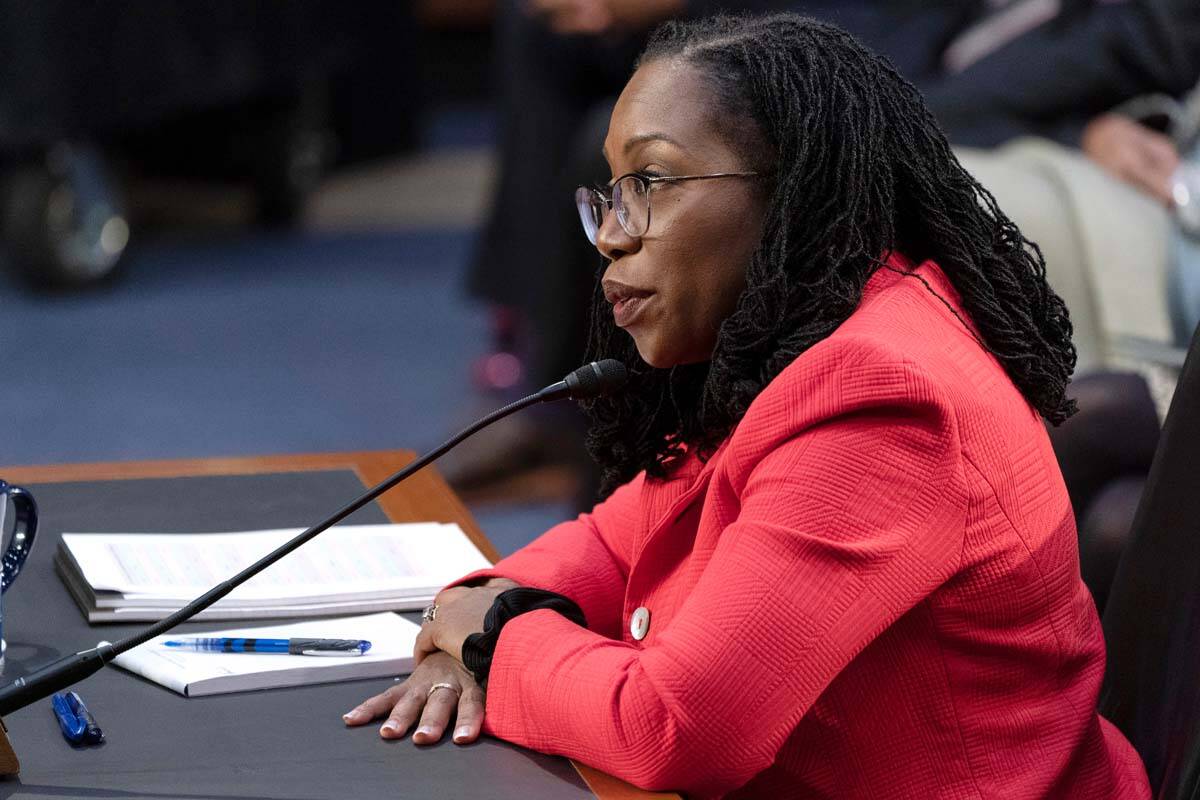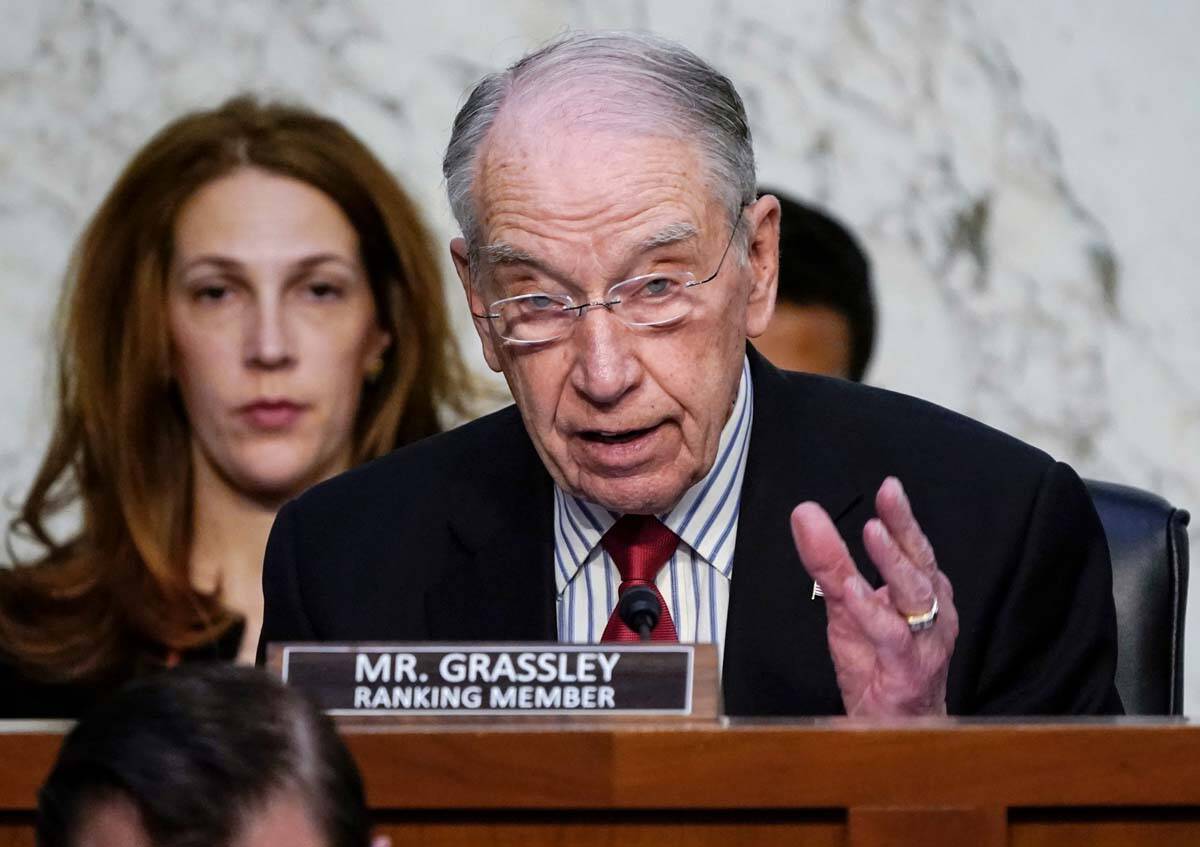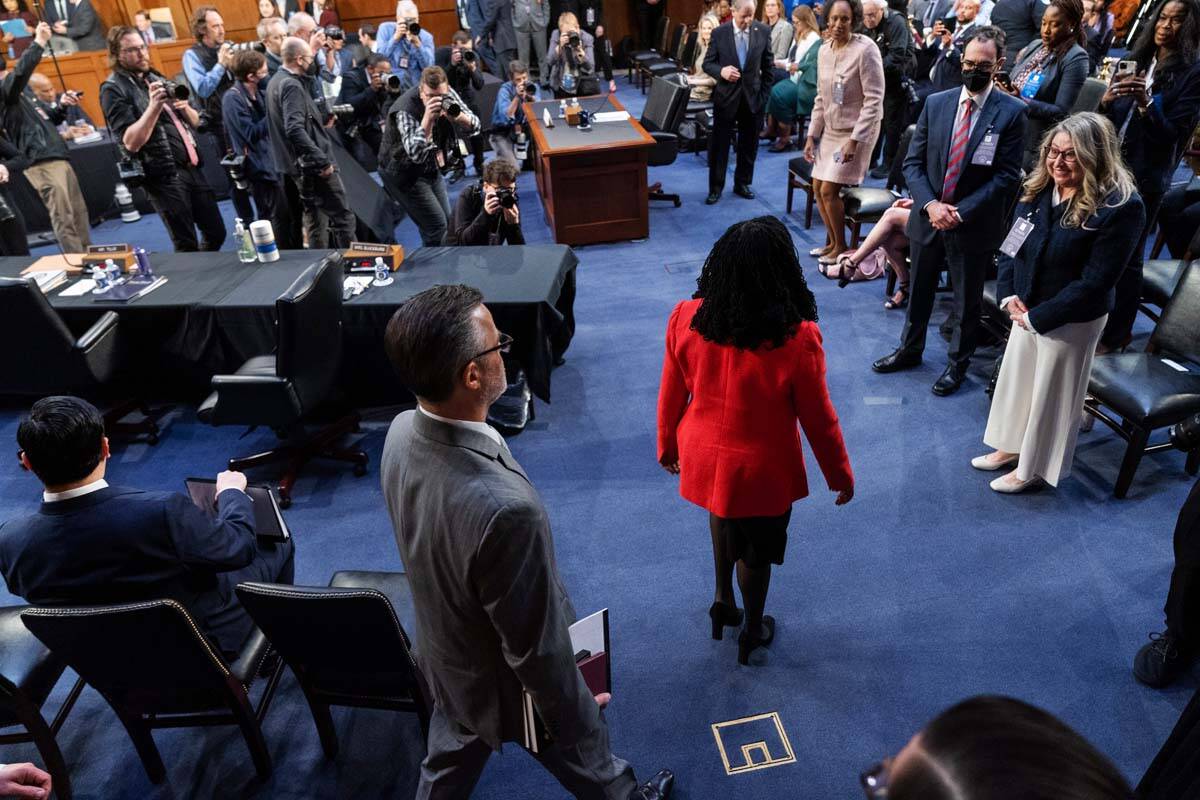Ketanji Brown Jackson defends record: ‘I try to stay in my lane’
WASHINGTON — Supreme Court nominee Ketanji Brown Jackson fended off Republican criticism Tuesday that her experience as a public defender transformed her into an activist judge who is lenient on criminals.
Jackson, 51, pushed back on those characterizations during a daylong confirmation Senate hearing.
If confirmed, she would become the first Black woman to serve on the high court.
But the historic diversity of the nomination took a back seat as the hearing heated up and Jackson forcefully defended her judicial record of independence to dispel suggestions that she would carry out a liberal agenda from the bench.
“I am acutely aware as a judge in our system that I have limited power,” Jackson told the Senate Judiciary Committee. “I try to stay in my lane.”
The marathon session began as senators questioned the nominee on a wide-range of topics. GOP lawmakers not only grilled Jackson about sentencing, religion, and hot-button conservative issues, but also denounced Biden administration policies while branding Democrats as soft on crime.
At the outset, Chairman Dick Durbin, D-Ill., told Brown that the second hearing day is affectionately known as a “trial by ordeal.”
Storming out
Republicans zeroed in on Jackson’s service as a federal public defender, and as a private lawyer, who represented clients held at the U.S. Navy base at Guantanamo Bay in Cuba following the Sept. 11, 2001 terrorist attacks.
Sen. Lindsey Graham, R-S.C., peppered Jackson over legal arguments she made on behalf of suspected terrorists being held at Guantanamo indefinitely by the U.S. government, and her argument that it constituted a violation of their rights.
“I don’t think it’s necessary to call the government a war criminal,” Graham fumed.
Texas Sen. John Cornyn, a Republican, went further, telling Jackson it appeared out of “character” for her to have called then-Defense Secretary Don Rumsfeld and President George W. Bush “war criminals” in a legal filing about a client’s rights.
Jackson didn’t recall leveling that charge.
And Durbin returned from a break with the legal document that she wrote about some practices at the Navy base that constituted torture, which was a violation of federal and international law. It did not specify that Bush or Rumsfeld as war criminals.
Jackson said she was a public defender when the Supreme Court ruled that detainees could be ordered held by executive authority at the military base in Cuba. She said the Supreme Court issued a second ruling that the detainees had the right to legal representation.
Calling 9/11 a “tragic, terrible attack on this country,” Jackson said federal public defenders were called upon to represent detainees after the Supreme Court rulings. And she noted her brother volunteered, joined the Army, and served in Afghanistan after the attack.
But Graham ramped up his argument that many of the Guantanamo detainees who were released had returned to the battlefield.
Durbin refuted Graham’s statistics with current figures.
A visually shaken Graham then launched into a tirade about the fate of the 39 detainees still being held in Cuba for acts against the United States. “Hope they all die in jail,” he said.
Republican and Democratic senators appeared startled as Graham suddenly stood up and stormed out of the hearing.
Lenient on crime
Sen. Josh Hawley, R-Mo., also hit Jackson with a barrage of questions on sentences she handed down as a federal District Court judge to defendants convicted on child pornography charges. Many were below federal sentencing guidelines and posed a danger to children, Hawley and Texas Sen. Ted Cruz claimed.
“I’m questioning your discretion and your judgment,” Hawley told Jackson.
Earlier, Jackson said any implication that she was deviating from guidelines to protect child pornographers was simply not true. “As a mother and a judge, nothing could be further from the truth,” she said.
In response to Hawley, Jackson explained that a Supreme Court ruling gave judges discretion in sentencing to reduce disparities.
And she explained that she was following congressional statutes that required her to consider recommendations from the U.S. Probation and Pretrial Services System.
Sen. Cory Booker, D-N.J., held up statistics showing roughly 80 percent of sentences in such cases were less than those suggested by federal sentencing guidelines. Jackson’s sentences were well within the norm of other judges in other states, he said.
The guidelines do not differentiate between those viewing material on their computers, and those producing the content, But Jackson said that with every defendant she explains the ramifications of their actions on innocent victims, relaying a story about a woman who was exploited as a child and so vulnerable as an adult that she refuses to go outside her home.
In the midst of the firestorm of questioning, Sen. Dianne Feinstein, D-Calif., lowered the tension in the room when she told Jackson: “This is a tough place, and you are handling it very well.”
Questions about experience
Even before the hearings, Democrats and Republicans stipulated that Jackson was well qualified to serve on the Supreme Court. She received the American Bar Association’s highest rating.
The line of Republican questioning appeared to underscore that.
“The GOP senators’ attacks on Judge Jackson Brown are shifting to her work experience, I suspect, because they were getting no traction on attacking her credentials/education which are solid,” said Anna Law, political science professor at City University of New York, Brooklyn College.
“The GOP senators have chosen to attack Judge Jackson’s work as a federal public defender by waving what they believe to be the most reviled of her clients, Guantanamo Bay detainees,” Law told the Review-Journal.
Republicans also queried Jackson on critical race theory, based on the concept that all conflict in society is race related.
Cruz, who attended Harvard Law School with Jackson, suggested the she has tried to incorporate critical race theory into sentencing and judicial practice.
The Texas senator also read from books about race from Georgetown Day School, a private school founded to integrate classrooms when the District of Columbia was segregated. Jackson’s daughters attended the school.
Although she is member school’s board, Jackson said she had not seen the books before.
She also said she had never studied critical race theory, or used it as a judge.
Booker jumped to her defense, saying the argument held no water and that the Texas lawmaker was “all hat and no cattle.”
Diverse endorsements
Other Democrats rushed to her defense on other topics. On Republican National Committee claims that Jackson is too partisan, Sen. Chris Coons, D-Del., referenced her ruling in favor of the RNC when it sought emails from Democratic presidential candidate Hillary Clinton.
Coons also mentioned the endorsement of Jackson by retired Judge Thomas Griffith, appointed by President George W. Bush, to serve on the D.C. Circuit Court of Appeals. Griffith introduced Jackson to the committee on Monday.
She also has been endorsed by the Fraternal Order of Police, 20 states attorneys general, including Aaron Ford of Nevada, and child victims advocacy groups.
President Joe Biden cited her cross-party appeal when he nominated Jackson to fill a vacancy created when Justice Stephen Breyer announced he would step down after this term. Jackson began her law career as a clerk for Breyer and other federal judges.
Confirmation is expected. Democrats control the Senate with Vice President Kamala Harris casting a tie-breaking vote.
Republican Sen. Susan Collins of Maine and Sen. Lisa Murkowski of Alaska supported Jackson for previous appointments. Collins said she is open to vote for Jackson’s confirmation. Graham also voted for Jackson before, but signaled has signaled his frustration because South Carolina federal Judge Michelle Childs did not get the nomination.
Jackson received bipartisan Senate votes for confirmation to serve on the U.S. Sentencing Commission, as a federal district judge for the District of Columbia, and to serve on the D.C. Circuit Court of Appeals.
Her nomination to serve on the Supreme Court is historic: Of the 115 justices who have held seats on the nation’s highest bench, 108 have been white men, Durbin said. Upon confirmation, Jackson would be only the third African American, following Thurgood Marshall and Clarence Thomas.
The Congressional Black Caucus said in statements that Jackson is one of the most qualified candidates for the high court in years, citing her rise from academic excellence to judicial posts and later judgeships.
“This is a pinnacle, a crescendo,” said Rep. Sheila Jackson Lee, a Houston Democrat who attended the Senate confirmation hearing as a guest. “This is an important place to be.”
Jackson also would be the sixth woman justice, and would serve with Sonia Sotomayor, Elena Kagan and Amy Coney Barrett, giving the nine-member court a 5-4 gender balance for the first time in history.
“This is the closest we’ve ever come to gender balance on the Supreme Court,” said Feinstein, who asked Jackson about that milestone.
“I think it would be extremely meaningful,” Jackson said.
Contact Gary Martin at gmartin@reviewjournal.com. Follow @garymartindc on Twitter.



